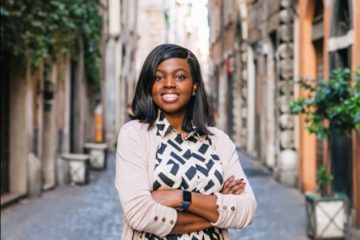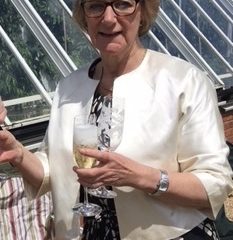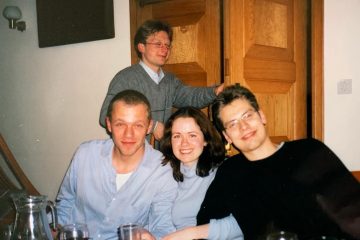In the celebratory year of fifty years since the admission of women to St. Edmund’s College I am privileged to have been a member of the College for forty of those years. I was elected a Fellow in 1980 to what was then known as St. Edmund’s House, an Approved Foundation within the Cambridge Collegiate system. I was one of two female Fellows in a total Fellowship of twenty, and a student body of eighty. The Master at that time was Revd Fr John Coventry SJ, who was destined to be the last Master in Holy Orders.
My first role in the College was Fellows’ Steward, the least coveted role by the Fellows. The task was defined by the vagaries of the in house catering service and the cost of provision of pre-lunch sherry in the Fellows’ Parlour. The College chef liked to cook with wine, and occasionally he even put it in the food. I recall being highly embarrassed as Fellows Steward at my first Norfolk Commemoration Feast: the first course was pigeon breasts which, when served, were indistinguishable from two tough lumps of liver. During that dinner the chef came to me at table to ask what he should do with the dessert: the crème caramel hadn’t set! Such were the scholarly decisions a Fellows’ Steward had to take calmly and hastily!
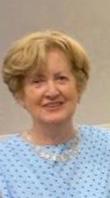
After two years as Fellows’ Steward I gleefully relinquished the post to the next newest unsuspecting Fellow, and I became Secretary of the Association, the forerunner of the Governing Body. This was less of a role in the direct firing line, and more of an administrative and “political” role. Council of the Association meetings took place in a smoke-filled room with ample sherry boosting lively discussions. A roll of a cigarette, a long slow drag on the fag by Master Coventry signalled “order, order” to end the discussion and reach a decision. All good decisions called for further shots of sherry before dinner. I’ve often wondered whether the reduction in the consumption of sherry in Cambridge Colleges had an impact on the decline of the sherry industry in Spain.
The election of a new Master in 1985 on Fr. John Coventry’s retirement opened an opportunity for those of us Fellows who promoted change and whose motivation was achieving full Collegiate status for St Edmund’s. Dr Richard Laws, CBE, FRS, Director of BAS, a man of immense academic standing coupled with impressive administrative acumen, was elected Master. He was the first non-Catholic to hold the position. His election was a giant step for the College to take, and not without its controversy. It was more than a mere storm in a sherry glass. The election marked a seismic shift in the College, in which the status quo was shattered and an exciting new era in the history of the College dawned.
Dick Laws spearheaded the growth and development of the College in the expansion of numbers of students, the Fellowship, the Estate, the change of name from St. Edmund’s House to St Edmund’s College, the application for full Collegiate status and the grant of a Royal Charter. His inspirational leadership of the College gained us recognition as a full-fledged College in the mainstream of the University of Cambridge. Many new building projects were undertaken including the soaring octagonal College tower which was opened by The Right Honourable Betty Boothroyd MP, the first woman to be Speaker of the House of Commons. On completion of the tower Dick famously said: “We are now looking down on the rest of Cambridge while they look up to us”. No longer did we need to answer the taxi-driver’s query … “St. Edmund’s, where?” We were known, we were recognised, and we held our heads high with pride in our College: it had found its place among the Colleges and the University.
St. Edmund’s celebrated its centenary year in 1996. Among the celebrations the Chancellor of the University, HRH Prince Philip, Duke of Edinburgh, made a visit to the College on 25th June 1996, the second of four visits, when he mingled with members of the College and attended the Centenary Dinner.
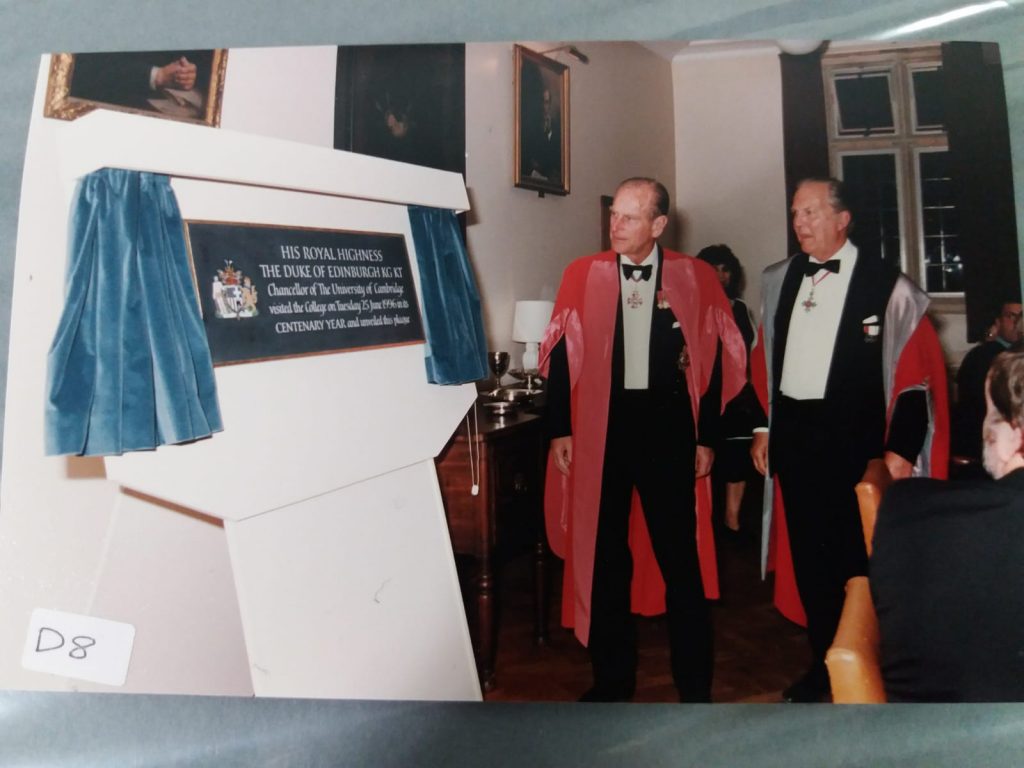
Throughout the Mastership years of Dick Laws I was privileged to hold the office of Secretary of the Association and the Governing Body. Thus, I had a ringside seat and participated fully in the epochal landmarks in the growth and development of the College. These were colourful and exciting times of change and progress which continued apace under the stimulating leadership of Professor Sir Brian Heap FRS. The process of petitioning for the Royal Charter was completed and granted under Sir Brian’s Mastership. I held the office of Secretary of the Governing Body for a further three years.
The Fellowship which by then had grown in number to fifty or so, was fortunate in the dedication of many of its Fellows, working tirelessly in demanding roles: Vice-Master, Bursar, Dean, Senior Tutor, Tutors and many others. Among those I remember with great sadness was the indomitable Terry McLaughlin who managed to combine a fulltime academic role in the University with his College responsibilities, and still have the energy to sing and dance all night! His contribution to the College was immeasurable , his voice prematurely silenced.
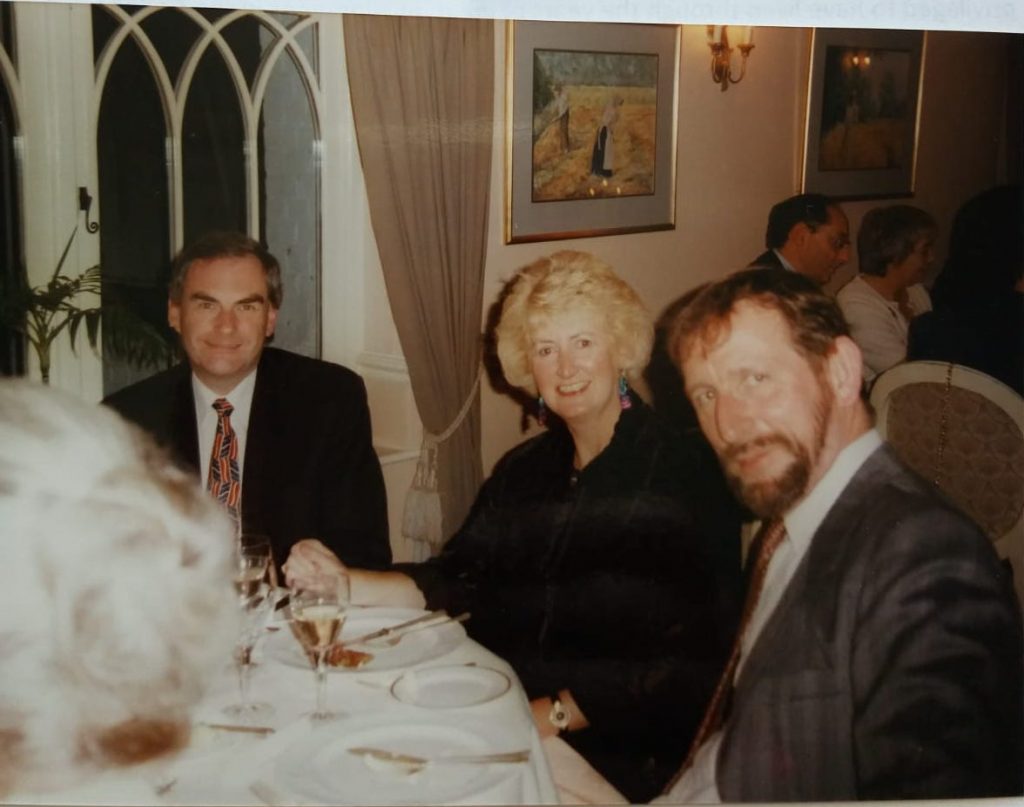
One of the attractions and benefits of St. Edmund’s College is its international status and inclusivity. I have enjoyed the company and friendship of people from all over the world. It has enriched my life and given me an insight into the wealth of cultures and beliefs of peoples of all nationalities. I feel privileged to have lived through the years of great development in the College and to have played some small part in making St. Edmund’s what it is today, a College confident in its status and comfortable in moving forward in a new era.
